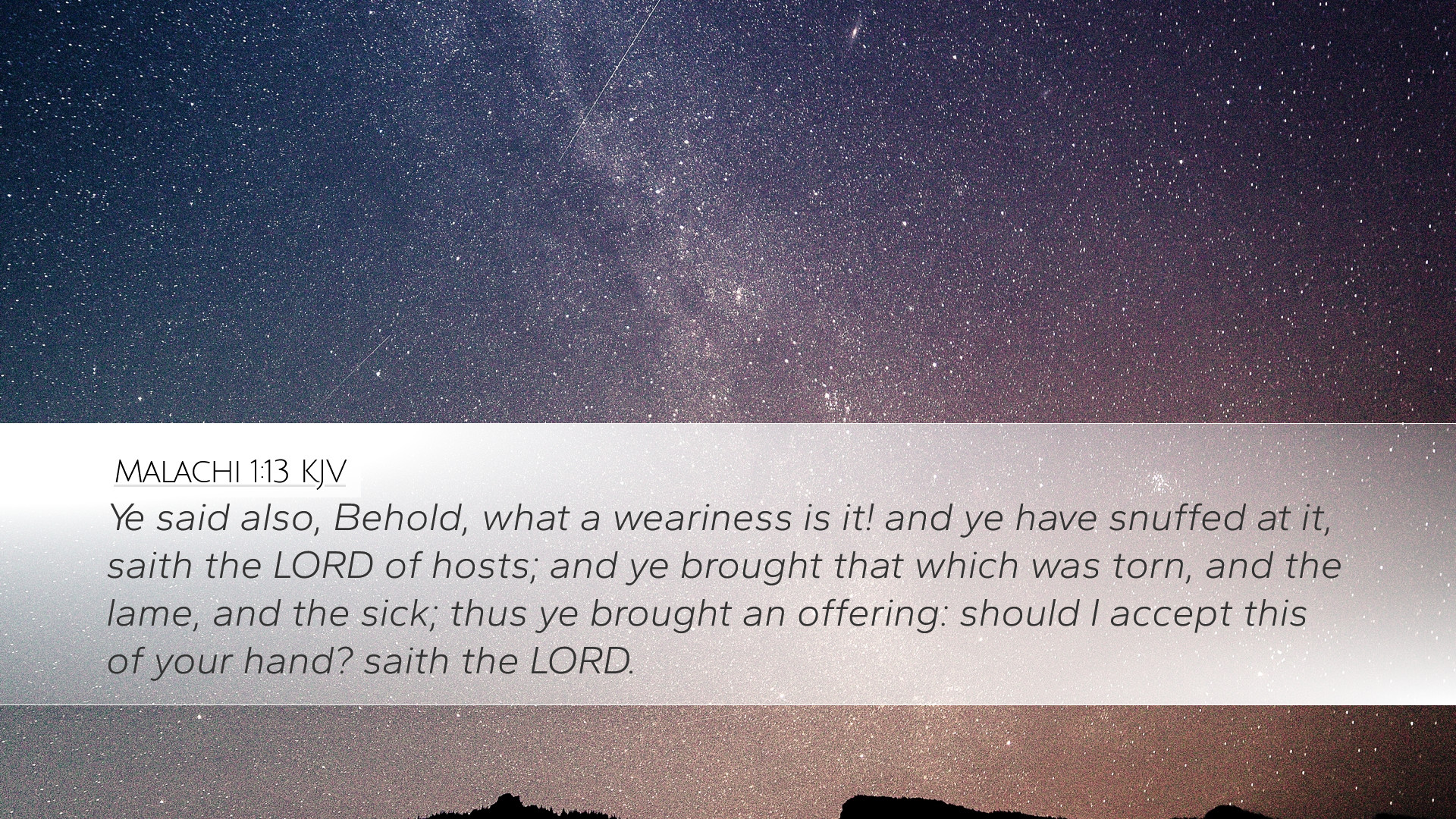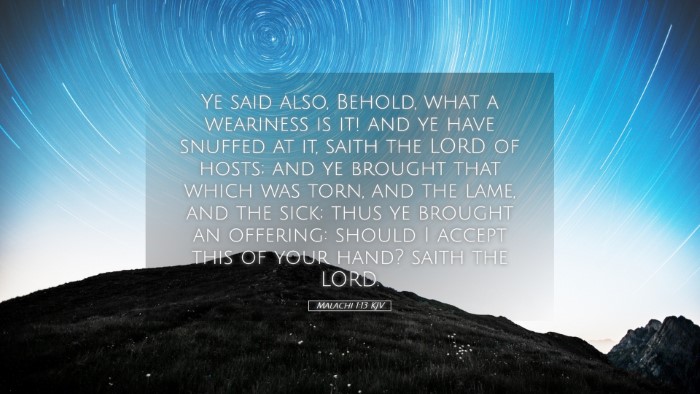Old Testament
Genesis Exodus Leviticus Numbers Deuteronomy Joshua Judges Ruth 1 Samuel 2 Samuel 1 Kings 2 Kings 1 Chronicles 2 Chronicles Ezra Nehemiah Esther Job Psalms Proverbs Ecclesiastes Song of Solomon Isaiah Jeremiah Lamentations Ezekiel Daniel Hosea Joel Amos Obadiah Jonah Micah Nahum Habakkuk Zephaniah Haggai Zechariah MalachiMalachi 1:13
Malachi 1:13 KJV
Ye said also, Behold, what a weariness is it! and ye have snuffed at it, saith the LORD of hosts; and ye brought that which was torn, and the lame, and the sick; thus ye brought an offering: should I accept this of your hand? saith the LORD.
Malachi 1:13 Bible Commentary
Commentary on Malachi 1:13
Verse Text: “You also say, ‘Oh, what a weariness!’ And you sneer at it,” says the Lord of hosts. “And you bring the stolen, the lame, and the sick; thus you bring an offering! Should I accept this from your hand?” says the Lord.
Introduction
The book of Malachi serves as a prophetic message addressing the covenant people of God after their return from Babylonian exile. It highlights various issues related to worship, sacrifice, and the spiritual condition of Israel. In this passage, Malachi confronts the insincerity of the people in their worship practices and addresses their lackadaisical attitude towards God, presenting a crucial call to genuine devotion.
Contextual Background
To understand Malachi 1:13, it is vital to consider the historical and social context of post-exilic Israel. Following their return, many Israelites had grown complacent and disillusioned, struggling to restore their identity and worship practices. The temple worship was being carried out with a diminishing sense of piety and reverence.
Malachi’s role as a messenger was to reestablish the fear of the Lord and to enhance the understanding of proper worship. The sacrifices, which were once intended to be an expression of devotion, had become mere routine for the Israelites.
Verse Analysis
This verse can be dissected into two main parts: the complaint of the people and God's response. Each part reveals substantial theological implications.
-
The Complaint of the People:
“Oh, what a weariness!” reveals the Israelites' disdain for their religious duties. They perceive their offerings as burdensome rather than a privilege to honor God. This attitude reflects a broader spiritual malaise, indicative of a heart turned away from genuine zeal for the Lord.
-
The Sneering Attitude:
The act of sneering indicates a contemptuous or mocking attitude towards God's requirements. Such irreverence speaks volumes about their spiritual condition — they have lost sight of the holiness and majesty of God.
-
The Nature of Their Offerings:
The verse addresses the practice of bringing “the stolen, the lame, and the sick” as sacrifices. This points to an egregious violation of the sacrificial norms outlined in the Law (Leviticus 22:20-22). Instead of bringing their best to God, they offer what is defective, reflecting a heart that does not value the sacredness of their relationship with God.
-
God's Response:
God’s rhetorical question, “Should I accept this from your hand?” serves as a pointed rebuke. It implies that such offerings are unacceptable, revealing that God desires true worship characterized by reverence and integrity. Their actions demonstrate a lack of understanding about the character of God.
Theological Insights
The deeper implications of this text reach into the fundamental understanding of worship and the nature of God’s expectations:
-
Worship as a Response to God's Holiness:
Worship cannot merely be an obligation; it is a response to the holiness of God. The attitude displayed by the Israelites emphasizes that worship involves a heart posture that recognizes the worthiness of God.
-
The Cost of Disobedience:
The defective sacrifices symbolize the cost of careless worship. Bringing less than one's best is a reflection of a heart not fully submitted to God. As highlighted in Hebrews 12:28-29, our worship must stem from reverence and awe for a consuming fire.
-
Community and Accountability:
The corporate nature of worship makes it imperative for communities of faith to hold one another accountable for how they approach God. Malachi's prophecy serves to remind leaders and congregants alike of their collective responsibility in honoring God.
Applications for Today’s Church
This passage challenges contemporary worship practices, pushing pastors, students, and congregants to examine the authenticity of their worship:
-
Reevaluation of Worship Practices:
Church leaders must ensure that worship practices do not become mere rituals. The heart of worship should be at the forefront — focusing on giving God our best, not what is convenient. This means fostering a culture of sincere devotion in church programs.
-
Encouragement of Authenticity:
Pastors should encourage congregations to cultivate a genuine heart of worship. This includes teaching about the importance of integrity in worship and the value of personal offering — both materially and in acts of service.
-
Addressing Complacency:
Just as Malachi called out Israel’s complacency, church leaders must be vigilant against spiritual lethargy within their communities. Regular teaching on the attributes of God and the calling of believers is crucial to maintaining a vibrant worship culture.
Conclusion
Malachi 1:13 serves as a crucial reminder of the heart behind worship. As we reflect on the Israelites' attitude towards worship, we are called to honestly examine our own hearts and practices. Both in Israel's time and today, God desires not just external compliance but an inner sincerity and commitment to His glory. The call to bring our best to the Lord is both a challenge and an invitation to experience the fullness of relationship with our Creator.


